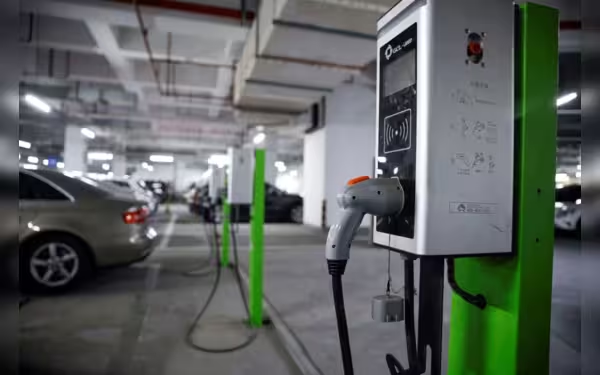Saturday, November 16, 2024 05:37 PM
Pakistan Launches First Locally Produced Electric Car in December
- First locally produced electric car to launch in December.
- Dewan Farooque Motors begins EV production in Pakistan.
- Government promotes electric vehicles for sustainable transportation.
 Image Credits: brecorder
Image Credits: brecorderPakistan is set to launch its first locally produced electric car in December, marking a significant step towards sustainable transportation.
In a significant development for Pakistan's automotive industry, the country is set to witness the launch of its first locally produced electric car in December. This initiative marks a pivotal moment in the transition towards sustainable transportation, reflecting a growing global trend towards electric vehicles (EVs). The announcement was made during a meeting chaired by Prime Minister Shahbaz Sharif, where the government discussed the increasing importance of EVs in the nation’s economy and environment.
Since 2022, the Pakistani government has been proactive in promoting the local production of electric vehicles. A total of 49 licenses have been issued for the manufacturing of two and three-wheeled EVs, with 25 factories already operational. The first license for the production of four-wheeled electric vehicles was granted in September 2024, paving the way for the upcoming electric car's market entry.
Electric vehicles are not just a trend; they represent a significant opportunity for Pakistan to reshape its automotive landscape. Dewan Farooque Motors Limited (DFML) has recently announced that it has begun production of EVs at its assembly plant, following approval from the Engineering Development Board (EDB). This move is expected to enhance the availability of electric vehicles in the market, catering to the growing demand for eco-friendly transportation options.
Moreover, the entry of Chinese electric vehicle giant BYD into Pakistan signifies the increasing interest of international players in the local market. With a population of nearly 250 million, Pakistan presents a lucrative opportunity for EV manufacturers, and the government is keen to capitalize on this potential.
During the recent meeting, Prime Minister Shehbaz Sharif emphasized the need for a comprehensive financial model for electric vehicles. He highlighted that EVs not only help save valuable foreign exchange by reducing reliance on petrol and diesel but also contribute positively to the environment. The Prime Minister has directed relevant authorities to finalize the Electric Vehicles policy by November and improve licensing regulations for EV manufacturing.
In an innovative approach, the government plans to distribute E-motor bikes to high-performing students in government schools, similar to its laptop scheme. This initiative aims to promote the use of electric vehicles among the youth, fostering a culture of sustainability from an early age.
Additionally, the Capital Development Authority has been tasked with creating a comprehensive plan for the electrification of public transport in Islamabad. This includes setting up recharge stations for electric vehicles along major routes such as motorways and national highways, ensuring that infrastructure keeps pace with the growing number of EVs on the road.
As Pakistan gears up for the launch of its first electric car, it is clear that the country is on the brink of a transportation revolution. The shift towards electric vehicles not only promises to enhance the automotive sector but also offers a pathway to a more sustainable future. With the right policies and infrastructure in place, Pakistan can lead the way in the adoption of green technology, benefiting both its economy and the environment.













